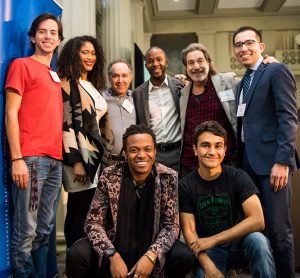2018 Martin Luther King Jr. Leadership Awards
 The Martin Luther King Jr. Leadership Awards are given annually to students, alumni, staff, groups and faculty who embody the spirit of Dr. King’s work. “Service to the community” is defined in the broadest sense and includes academic, research, religious, and secular contributions in which integrity, leadership, creativity, and positive outcome are apparent.
The Martin Luther King Jr. Leadership Awards are given annually to students, alumni, staff, groups and faculty who embody the spirit of Dr. King’s work. “Service to the community” is defined in the broadest sense and includes academic, research, religious, and secular contributions in which integrity, leadership, creativity, and positive outcome are apparent.
There were three student MLK Jr. Leadership Award recipients this year, as well as one student group:
Joshua Woodward, an undergraduate mechanical engineering major, grew up in Chicago’s South Side, where he excelled in violin, robotic competitions, and where he developed a passion for social justice issues. During his time here, Josh contributed to MIT’s efforts to support another student affected by a travel ban as a student member of President Reif’s Presidential Advisory Committee. He played an important leadership role in championing diversity and inclusion, particularly for the African-American student community, through his work as co-president of Chocolate City. His lobbying efforts helped Alpha Phi Alpha (APA), a national black fraternity, gain recognition by the Fraternity, Sorority, Independent Living Groups (FSILG) office, allowing APA to recruit more effectively and increase their membership. Josh plans to pursue a future career in public policy, using the analytical skills he learned at MIT to devise effective strategies for change, and eventually to become the Mayor of Chicago.
Tsehai Grell participated in the MIT Summer Research Program (MSRP) as an undergraduate at Morgan State University. When she returned to MIT as a graduate student in the chemistry department, she gladly mentored MSRP students, both in the lab and by creating a welcoming environment at MIT for students from minority communities. She also extends her mentoring to other undergraduates and is a role model and significant contributor to the core culture of the Drennen group. As President of the Black Graduate Student Association (BGSA), Tsehai helped the Institute establish a road map that aligned with the BGSA’s outlook for MIT’s future, and continues to support the progress of this agenda. Tsehai has made many contributions to improve the graduate student experience in the Chemistry Department, and has thoughtfully used participation in panels and visiting committees as opportunities to voice concerns for fellow students and improve the climate of the department.
Josué Lopez, a graduate student in Electrical Engineering and Computer Science, is also a leader focused on issues of diversity and social justice. Josué served as President of the Academy of Courageous Minority Engineers (ACME), which provides an important forum for graduate students of color to support each other through the process of completing at PhD at MIT. He goes above and beyond to make sure that every student feels supported at MIT, helps them to avoid his own pitfalls, and points them to helpful resources. He has started a new ACME Faculty lunch series this year; he organized last year’s Forum on Racial and Environmental Equity and Justice; and serves on the Planning Committee of the Graduate Students of Color Welcome Lunch, an important modification to grad student Orientation. He acts as a voice to senior leadership regarding supporting student of color and underrepresented minority PhDs at MIT, and actively assists with recruitment of new students. Josué inspires his fellow students by his passion, dedication and commitment to our community.
The Caribbean Initiative undertaken by the Association of Puerto Rico Students (APR) did important work in the wake of the devastating hurricanes last fall, which created massive infrastructure damage as well as power outages and food and water shortages. With the leadership of sophomore Jose Soto Rivera and senior Gabriel Ginorio, in the immediate aftermath of the hurricanes the APR joined forces with other members of the MIT and Harvard communities first to collect donations of money, food, and supplies, and subsequently to create a website to connect and mobilize people to wanted to help as well as generate project ideas. They also moved quickly to convene faculty members, students, and Caribbean leaders at the Conference on the Resilient Construction of the Caribbean in December. In the process, they brokered ongoing working relationships between MIT faculty members and Caribbean leaders, they engaged NGO representatives and visiting academics, and they planned student projects starting in IAP. All of these efforts require enormous contributions of time and energy, and even personal sacrifice, from these busy students.
—Heather Konar, OGE
